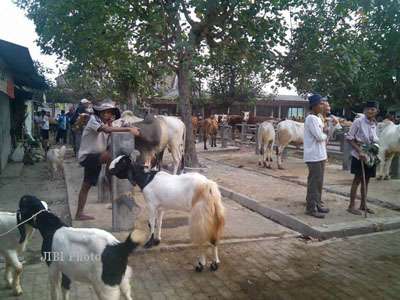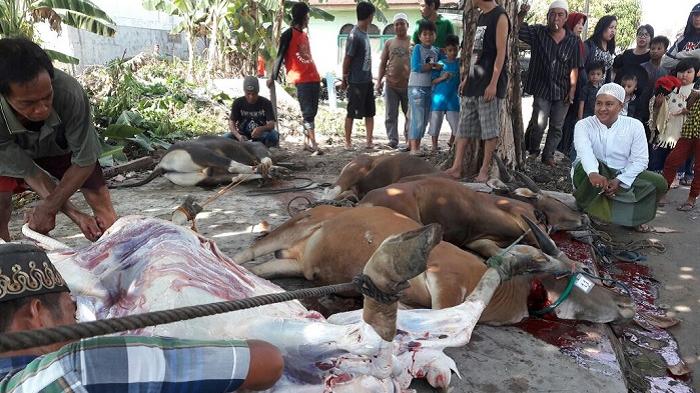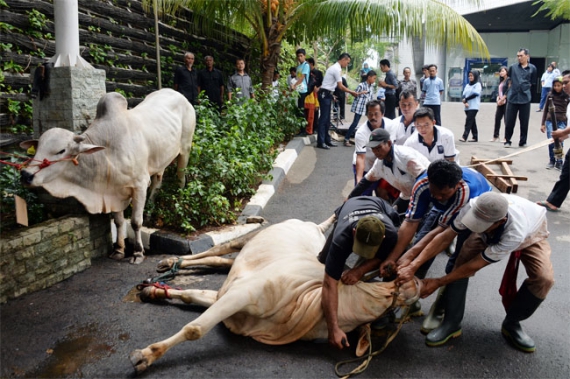At the end of the Hajj (annual pilgrimage to Makkah), Muslims throughout the world celebrate the holiday of Eid al-Adha (Festival of Sacrifice).
During the Hajj, Muslims remember and commemorate the trials and triumphs of the Prophet Ibrahim. The Qur’an describes Ibrahim as follows:
“Surely Ibrahim was an example, obedient to Allah, by nature upright, and he was not of the polytheists. He was grateful for Our bounties. We chose him and guided him unto a right path. We gave him good in this world, and in the next life he will most surely be among the righteous.” (Qur’an 16:120-121)
One of Ibrahim’s main trials was to face the command of Allah to slaughter his one and only son. Upon hearing this command, he prepared to submit to Allah’s will. When he was all prepared to do it, Allah revealed to him that his “sacrifice” had already been fulfilled. He had shown that his love for his Lord superseded all others, that he would lay down his own life or the lives of those dear to him in order to submit to Allah.
During the celebration of Eid al-Adha, Muslims commemorate and remember Ibrahim’s trials, by themselves slaughtering an animal such as a sheep, goat, cow, or buffalo. This action is very often misunderstood by those outside the faith.
Allah has given us power over animals and allowed us to eat meat, but only if we pronounce His name at the solemn act of taking life. Muslims slaughter animals in the same way throughout the year. By saying the name of Allah at the time of slaughter, we are reminded that life is sacred.
 The meat from the sacrifice of Eid al-Adha is mostly given away to others. One-third is eaten by immediate family and relatives, one-third is given away to friends, and one-third is donated to the poor. The act symbolizes our willingness to give up things that are of benefit to us or close to our hearts, in order to follow Allah’s commands. It also symbolizes our willingness to give up some of our own bounties, in order to strengthen ties of friendship and help those who are in need. We recognize that all blessings come from Allah, and we should open our hearts and share with others.
The meat from the sacrifice of Eid al-Adha is mostly given away to others. One-third is eaten by immediate family and relatives, one-third is given away to friends, and one-third is donated to the poor. The act symbolizes our willingness to give up things that are of benefit to us or close to our hearts, in order to follow Allah’s commands. It also symbolizes our willingness to give up some of our own bounties, in order to strengthen ties of friendship and help those who are in need. We recognize that all blessings come from Allah, and we should open our hearts and share with others.
It is very important to understand that the sacrifice itself, as practiced by Muslims, has nothing to do with atoning for our sins or using the blood to wash ourselves from sin. This is a misunderstanding by those of previous generations: “It is not their meat nor their blood that reaches Allah; it is your piety that reaches Him” (Qur’an surah Al-Hajj, 22:37).
The symbolism is in the attitude – a willingness to make sacrifices in our lives in order to stay on the Straight Path. Each of us makes small sacrifices, giving up things that are fun or important to us. A true Muslim, one who submits his or herself completely to Allah, is willing to follow Allah’s commands completely and obediently.
It is this strength of heart, purity in faith, and willing obedience that Allah desires from us.
On the first morning of Eid al-Adha, Muslims around the world attend morning prayers at their local mosques. Prayers are followed by visits with family and friends, and the exchange of greetings. At some point, members of the family will visit a local mosque the slaughter of an animal. The meat is distributed during the days of the holiday or shortly thereafter to the poor and the needy.
 Muslims honor and respect the Prophet Ibrahim. The Quran describes him as “a man of truth, a prophet” (Quran 19:41). Many aspects of Islamic worship, including pilgrimage and prayer, recognize and honor the importance of the life and teachings of this great prophet.
Muslims honor and respect the Prophet Ibrahim. The Quran describes him as “a man of truth, a prophet” (Quran 19:41). Many aspects of Islamic worship, including pilgrimage and prayer, recognize and honor the importance of the life and teachings of this great prophet.
The Quran sums up the view of the Prophet Ibrahim among Muslims: “Who can be better in religion than one who submits his whole self to Allah, does good, and follows the way of Ibrahim the true in Faith? For Allah did take Ibrahim for a friend” (Quran 4:125).
Ibrahim is the father of other prophets (Ismail and Ishak) and the grandfather of Prophet Jakub. He is also one of the ancestors of the Prophet Muhammad (peace and blessings be upon him). Ibrahim is recognized as a great prophet among believers in the monotheistic faith, such as Islam.
The Quran repeatedly describes the Prophet Ibrahim as a man who believed in One True God, and was a righteous example for us all to follow:
“Ibrahim was indeed a model, devoutly obedient to Allah, (and) true in Faith, and he joined not gods with Allah. He showed his gratitude for the favours of Allah, who chose him, and guided him to a Straight Way. And We gave him Good in this world, and he will be, in the Hereafter, in the ranks of the Righteous. So We have taught thee the inspired (Message), “Follow the ways of Ibrahim the True in Faith, and he joined not gods with Allah” (Quran 16:120-123).
He realized that there must be only One God. He was chosen as a Prophet and dedicated himself to the worship of Allah Azza Wa Jalla.*****

